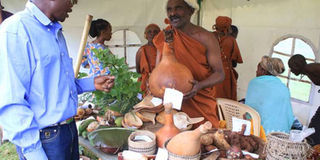Let us make all tourism green and clean

The Nyeri Cultural and Tourism Festival, whose theme was on enhancing livelihoods through sustainable cultural tourism, at Dedan Kimathi Stadium on June 23, 2016. PHOTO | JOSEPH KANYI | NATION MEDIA GROUP
What you need to know:
You can use your holiday to make more than memories.
With sustainable choices, you can help make our world cleaner and greener.
And you can be a global ambassador for respect – respect for our planet, our culture and the communities that welcome us with open hearts.
Whether it is a chic, zero-emission hotel in Milan where toiletries are 99 per cent biodegradable, or Gaansbai in South Africa, where conservation of native flora and fauna is a community-wide priority, sustainable tourism is growing fast across the globe.
It is a tribute to the myriad entrepreneurs, companies, individuals and communities that the United Nations is marking 2017 as the International Year of Sustainable Tourism for Development. Throughout this year, activities and initiatives will celebrate its transformational power of tourism on our global efforts to create a world that is cleaner and greener, more equal and more inclusive.
Research shows that a rising number of travellers want to tread lightly. The modern tourist wants to give back to the countries and communities they visit and reduce their impact on the environment. The campaign “Travel.Enjoy.Respect” that is linked to the International Year aims at precisely underlining the role of the traveller in amplifying the potential of tourism while avoiding damage on the environment. But what are the options for the would-be green traveller? How much of an impact can one person have? The answer is a lot. This is because global tourism is really big business. According to the World Tourism Organisation, tourist spending swelled from only $2 billion in 1950 to $1.2 trillion in 2015. The number of international tourists has grown from 25 million travelled in 1950 to 1.2 billion in 2015.
GOOD NEWS
Domestic tourism is even bigger. It is estimated that between five and six billion people take holidays at home. In one way or another, we are almost all tourists. This is good news. Countless jobs have been created in the process, many for the poor. It also means the potential in tourism going green is massive. But sustainable tourism still only represents one per cent of the global industry.
Tourism generates five per cent of global greenhouse gas emissions. According to UN Environment, that proportion is higher – 12.5 per cent – if factors such as energy use at hotels and transporting food and toiletries are included. Other sobering figures include water use. A tourist in Europe will consume more water on holiday than at home. Those staying at luxury hotels use nearly three times as much as a result of the water used for swimming pools and golf courses. Then there is waste generation at resorts or from cruise ships; overfishing on coral reefs to feed visitors; loss of animal and plant species linked with the construction and operation of resorts.
NO SIGN
Industry growth shows no sign of slowing. By 2020 the number of global tourists will reach 1.6 billion. To reach the targets set by the Paris Agreement on climate change and the Sustainable Development Goals, we need a sea change in tourism. This year, you, the consumer, can make a difference. Getting started can be tricky. There can be hundreds of different sustainable tourism standards to choose from. The Global Sustainable Tourism Council has a reliable guide, and maintains recent sustainability criteria for hotels, destinations and tour operators. Next, buy guidebooks with information on green options in the country, city, community and hotel you plan to visit. If guidebooks are encouraged to list more environmentally friendly options, you benefit from choice and green destinations benefit from exposure.
Then, find out more about where you choose to go. Ask questions of tour operators and destinations about how they manage water and waste. Do they source fruit, vegetables and meat locally and have clear and positive local employment policies? Are they drawing electricity from renewables? Decide where you spend your money based on these factors. While aircraft are becoming more efficient, air travel is still one of the most damaging modes of transportation to the climate per kilometre travelled.
You can use your holiday to make more than memories. With sustainable choices, you can help make our world cleaner and greener. And you can be a global ambassador for respect – respect for our planet, our culture and the communities that welcome us with open hearts.
Taled Rifai is director-general, World Tourism Organization; Erik Solheim is head, United Nations (UN) Environment; and Patricia Espinosa is executive secretary, UN Framework Convention on Climate Change.




